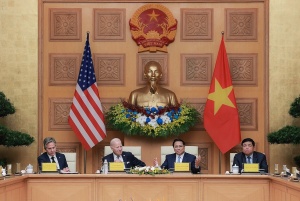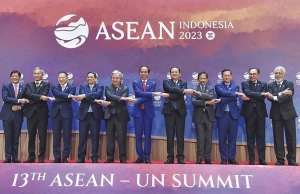More advances can support Vietnam’s aspirations
Today, the United States and Vietnam are close friends and American companies and investors are now active in almost every sector of Vietnam’s economy, helping to integrate the country into the global supply chain, creating quality jobs, and making the country more productive, safe, and cleaner. It is a credit to the people of both nations that we have been able to move beyond the tragedies of our shared past to build such a strong, vibrant relationship anchored in mutual respect.
 |
| Adam Sitkoff - Executive director American Chamber of Commerce in Hanoi |
Trade is the cornerstone of the bilateral relationship and significant changes have taken place over the past few decades. In 1995, bilateral trade was just $451 million. Last year’s volume surpassed $123 billion, and US companies have contributed significantly to the transformation and growth of Vietnam’s economy.
The American Chamber of Commerce in Vietnam (AmCham) now represents more than 650 corporate and 2,500 individual business representatives throughout the country, accounting for billions of US dollars in foreign investment, tens of thousands of direct employees, hundreds of thousands of indirect employees, and a significant share of Vietnam’s exports and tax revenues.
The US is one of the top foreign investors in Vietnam, with American companies investing in manufacturing and infrastructure, providing high-quality consumer, agricultural, and industrial goods and services. The US is Vietnam’s biggest export market, and Vietnam is now the seventh-largest trading partner of the US.
Of equal importance are cultural links. The US has the largest population of Vietnamese people outside Vietnam, and Americans of Vietnamese ancestry are playing a critical role in its development. Their investment, as well as their talent and entrepreneurship, have helped drive the nation’s impressive economic growth. Back in 1995, only 60,000 Americans visited Vietnam. That number grew to almost 700,000 visitors per year towards 2020.
Nonstop flight to San Francisco are now helping to attract even more visitors. In addition, around 30,000 young Vietnamese people are studying in the US, where they are acquiring much-needed skills and knowledge.
American companies and investors bring high-quality products and state-of-the-art technologies, services, and business practices to Vietnam. We share an interest in developing a globally competitive workforce, creating quality jobs, and investing in the professional development of our Vietnamese team members. High-quality foreign investors not only help grow the economy, but also help grow the entire ecosystem of local companies and entrepreneurs here.
Vietnam is increasing its attractiveness as a destination for American investment as many companies seek to diversify their global supply chains. I believe the most important factor for a favourable investment climate is a fair, predictable, and streamlined regulatory environment that values innovation - not only to entice new investment, but also to maintain and grow the investment already here. There is no doubt that existing investors expanding operations is the best advertisement to pull in new funding.
AmCham places great importance on our engagement with the government. We believe that robust dialogue between the government and the private sector helps lead to optimal public policy outcomes. However, some regulations continue to introduce new administrative procedures such as licensing, approvals, and heavy reporting requirements. For example, there is still uncertainty and a lack of clarity regarding the requirements to obtain work permits for foreigners.
We encourage the government to clarify those elements of Vietnamese law that hinder the efficient deployment of foreign investment, and that any additional administrative burdens in draft laws and regulations be carefully considered and avoided whenever possible.
Crucial to many US manufacturers choosing Vietnam is the ready access to renewable power. Any plans for expansion of current facilities or supply relocations should include green energy solutions. To achieve its zero-carbon goal by 2050, Vietnam should prioritise energy sources that are both affordable and socially sustainable. This process will require financial and technical support from external sources – and the projects need to be realistic and bankable.
Vietnam should eliminate current regulatory uncertainties to unlock substantial international capital waiting on the sidelines. We know that new power grid projects will attract investment and expand the capacity of the country’s renewable energy sources, providing safe and reliable energy supply for both residential and commercial consumers.
AmCham appreciates the government’s effort to support Vietnam’s transition to a digital economy. Our members work actively to support this transformation, both with Vietnamese partners and through their own projects. We urge the government to take a holistic approach and global view in developing a digital regulatory framework. The free flow of data across borders, and access for Vietnamese users to global-standard services and data protection, are vital to that transition.
We encourage continuous improvements in infrastructure development, protection of intellectual property, education reform, health and wellness policies, legal and tax policy certainty, and enhanced transparency in Vietnam. AmCham looks forward to partnering with the government to navigate these challenges and improve business conditions that strengthen the private sector, ensure sustainable economic and social development, and promote prosperity here.
Progress in these areas will not only help attract more foreign investment, but will also support Vietnam’s aspirations to propel itself to the next sphere of economic competitiveness.
 | Vietnam and US companies collaborate on semiconductors and innovation High-level meetings between the US and Vietnam have paved the way for a strategic partnership focusing on the technology sector, with semiconductors and innovation at the forefront. |
 | No more business as usual within ASEAN ASEAN member states have committed to creating a more competitive investment environment, as Vietnam tries to lure more funding from the bloc and its partner countries. |
What the stars mean:
★ Poor ★ ★ Promising ★★★ Good ★★★★ Very good ★★★★★ Exceptional
Related Contents
Latest News
More News
- Vietnam, New Zealand seek level-up in ties (February 19, 2026 | 18:06)
- Untapped potential in relations with Indonesia (February 19, 2026 | 17:56)
- German strengths match Vietnamese aspirations (February 19, 2026 | 17:40)
- Kim Long Motor and AOJ Suzhou enter strategic partnership (February 16, 2026 | 13:27)
- Haiphong welcomes long-term Euro investment (February 16, 2026 | 11:31)
- VIFC in Ho Chi Minh City officially launches (February 12, 2026 | 09:00)
- Norfund invests $4 million in Vietnam plastics recycling (February 11, 2026 | 11:51)
- Marico buys 75 per cent of Vietnam skincare startup Skinetiq (February 10, 2026 | 14:44)
- SCIC general director meets with Oman Investment Authority (February 10, 2026 | 14:14)
- G42 and Vietnamese consortium to build national AI infrastructure (February 09, 2026 | 17:32)

 Tag:
Tag:
















 Mobile Version
Mobile Version